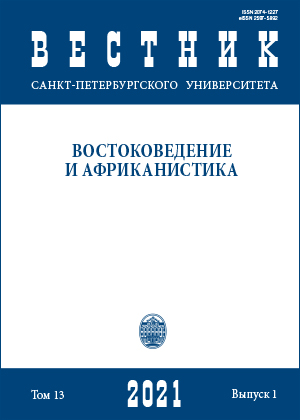Techniques and Practices of Speech Expression in Arab Diplomatic Communication
DOI:
https://doi.org/10.21638/spbu13.2021.107Abstract
The article is devoted to analysis of the techniques and practices of speech expression in Arab diplomatic communication through the example of speeches made by Arab diplomatic corps representatives and politicians at various UN venues. Original texts of speeches made by Permanent Representatives of Arab countries at the UN concerning the situation in the Middle East were chosen as the material for the study. The time frame covers the period from 2011 to 2018. The UN’s multimedia resources are one of the largest platforms for diplomatic dialogue open to the general public. Due to the intensification of relations between Russia and the Arab countries, it is necessary to identify the specifics of Arab diplomatic communication, as the speaker’s statements are not intended to express his or her own attitude and assessment, but the attitude of the state he or she represents. When analyzing the texts of speeches by diplomatic corps representatives in general, we observed the interpenetration and mutual influence of several types of language styles, which depend on the specifics of the issue under discussion: officialese style, inherent in diplomatic correspondence, and publicistic, which is found in public speeches. The intermingling of styles undoubtedly affects both the lexical and syntactic weight of the texts in a statement. In turn, Arab speakers cannot remain emotionally indifferent to the problems of their region due to the difficult political situation in the Middle East. For this reason, we noted not only a regular deviation from diplomatic speech standards, primarily the abundance of emotionally evaluative vocabulary in the texts of their speeches, but also special strategies for constructing texts that help to have a certain effect directed at listeners and opponents — expression. Among the most commonly used methods of speech expression, we have identified repetition, cohesion, convergence and the effect of defeated expectancy. By means of analysis of expressive syntaxes we studied the specifics of the use of these methods of speech expression at the level of usual-clichéd Arabic text and highlighted the specifics of tapping this speech strategy in the language of Arabic diplomacy.
Keywords:
modern standard Arabic, language of Arabic diplomacy, speech expression
Downloads
References
Downloads
Published
How to Cite
Issue
Section
License
Articles of "Vestnik of Saint Petersburg University. Asian and African Studies" are open access distributed under the terms of the License Agreement with Saint Petersburg State University, which permits to the authors unrestricted distribution and self-archiving free of charge.





